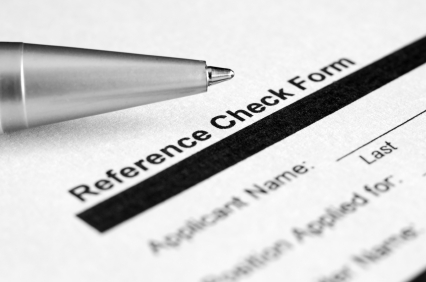 Of the many facets involved in searching for and securing a new job, one activity that too often is given only cursory thought is soliciting and preparing references. If this is your first job, you may turn to a teacher who will tout your academic preparation and achievements, a coach who will vouch for your disciplined training approach and good sportsmanship, or perhaps a relative that will praise your character and charm. Given some experience in the working world, you will likely opt for an immediate supervisor or manager and by default anyone with an impressive job title who has even passing knowledge of who you are.
Of the many facets involved in searching for and securing a new job, one activity that too often is given only cursory thought is soliciting and preparing references. If this is your first job, you may turn to a teacher who will tout your academic preparation and achievements, a coach who will vouch for your disciplined training approach and good sportsmanship, or perhaps a relative that will praise your character and charm. Given some experience in the working world, you will likely opt for an immediate supervisor or manager and by default anyone with an impressive job title who has even passing knowledge of who you are.
Most job seekers expect those who agree to serve as references will write glowing letters of recommendation or speak highly of them; at the very least they expect their references will not harm their prospects. Far too often the references meet only the lower threshold. However, carefully selected, respectfully solicited and amply prepared, your job references can have a very positive influence on your chances for success.
Select professional references who are most familiar with your skills, knowledge and work experiences that are essential for the job you are applying for. It is helpful to choose references who speak and write well, who are well regarded for their ability to assess employee talent, and who are inclined to bestow praise when deserved.
Solicit your references in person, if at all possible, or by phone or in writing. Do it yourself, avoid intermediaries. Tell them why you have hand-selected them as your reference.
Brief your references on your career objectives, the specifics of the job(s) you are applying for, and what you believe makes you a strong candidate. The more your reference knows about the prospective employer, the position and how your qualifications make you a preferred candidate, the more they can help you. Providing this information in bullet point form may be helpful, however do not volunteer to write your own letter of recommendation for your references’ signature. This presumes your reference is too busy, too lazy or too disinterested to draft a letter independently. If this is true, why would you ask them?
Your job references should be diverse in all manner of speaking. Represent multiple past employers, include testimonials from superiors, subordinates, management, labor, different professions, genders, ethnic and cultural groups if possible. This will reflect well on your broad appeal, ability to relate well to others, and to network and build supportive relationships. It demonstrates the depth and breadth of your experiences.
Update your references with respect to added skills, knowledge and notable achievements. Be candid and forthright in divulging any development which might cause them to alter their endorsement of you. Remember you are asking them to put their own professional reputation on the line. Finally, be sure to provide those who furnish you with a reference feedback as to how you fared in the selection process and follow-up with a written sincere and cordial note of thanks.




The CIG career board is rich in job postings and all support resources pages. The abundance of excellent information helps both the employer and jobseeker understand the fundamental importance how government operates. In many ways this can mirror the private sector and ultimately what it means to pursue a career in the public sector.